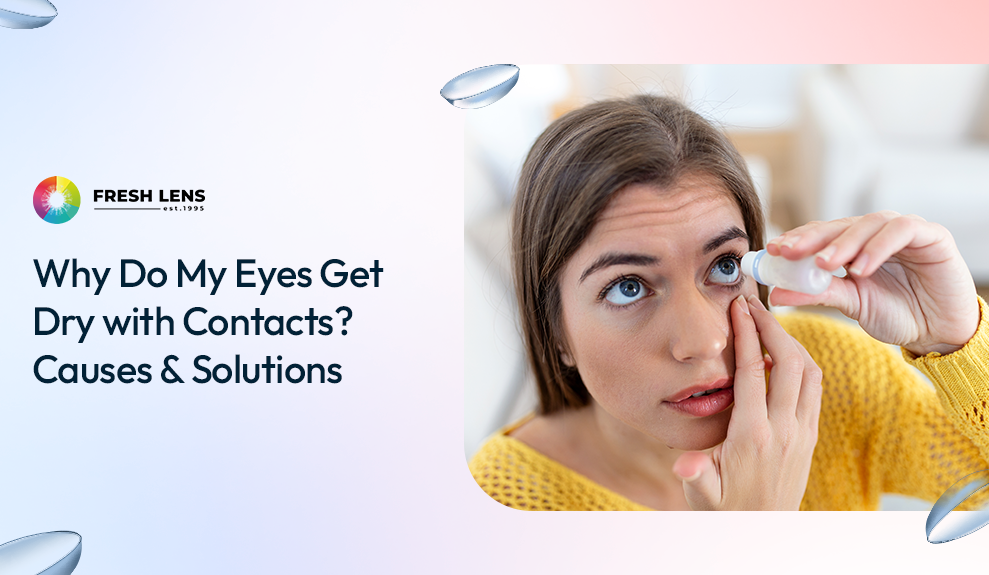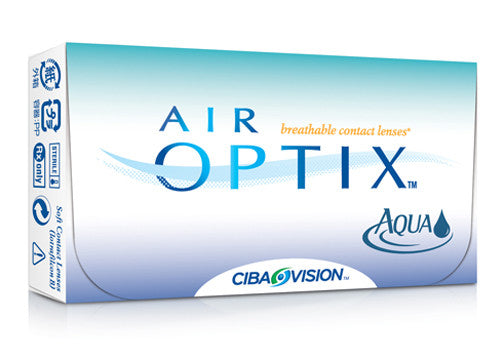
Wearing contact lenses is supposed to make life easier by giving you clear vision without glasses. So it can be frustrating when your eyes feel dry and irritated with contacts in. If you’re struggling with dry eyes with contact lenses, you’re not alone. The good news is that by understanding why this happens and taking some proactive steps, you can enjoy your contacts comfortably without constantly reaching for eye drops.
Understanding Dry Eyes
Dry eyes mean your eyes aren’t getting enough lubrication. Normally, a healthy tear film coats the eye to keep it moisturized and protected. Dry eyes happen when you don’t produce enough tears or when tears evaporate too quickly. This leads to dryness and irritation. Anyone can develop dry eyes, but it’s especially common as we age or if we spend a lot of time in dry environments.
Causes of Dry Eyes
There are many potential causes behind dry eyes. Often it’s a combination of factors. Some of the most common causes include:
- Environment: Exposure to wind, smoke, air conditioning, or low-humidity climates can cause tears to evaporate faster, leading to dry eyes.
- Screen time: Staring at computer or phone screens reduces your blinking rate, so your eyes dry out more quickly.
- Contact lens use: Wearing contacts for long periods or not caring for them properly can be a major cause of dry eyes with contact lenses.
- Age and hormones: Tear production tends to decrease with age. Hormonal changes, especially in women (for example, during menopause), can contribute to dryness.
If you’re wondering which types of lenses can help minimize dryness, our guide on the best contacts for dry eyes offers detailed insights and recommendations.
Symptoms of Dry Eyes
If your eyes are dry, you’ll likely experience one or more of these symptoms:
- Stinging, burning, or a scratchy feeling in the eye.
- Redness and irritation, especially after wearing contacts for a while.
- A gritty sensation, as if there’s sand in your eye.
- Blurry or fluctuating vision, particularly when contact lenses start to dry out.
- Excess tearing (watery eyes), your eyes may water as a reflex response to dryness.
These symptoms can range from mild to very uncomfortable. You might notice them more in certain situations, like after a long day of screen use or when you’re in an air-conditioned room.

Do Contact Lenses Cause Dry Eyes?
Are contacts to blame for your dry eyes? Contact lenses by themselves don’t usually cause chronic dry eye, but they frequently trigger dry eye symptoms. Many wearers notice their eyes getting dry and uncomfortable, especially later in the day. This happens because a contact lens can disrupt your eye’s natural tear film and limit oxygen to the cornea, causing tears to evaporate faster. If you’re prone to dryness, contacts will make it worse. In short, contacts often lead to dry, uncomfortable eyes for many people (even if they’re not always the sole cause).
If you already experience dryness, some specialized options, like scleral contact lenses for dry eyes, can provide long-lasting comfort by holding a moisture layer on your eye.
How Contact Lenses Impact Dry Eye Condition
Contact lenses affect your eyes in several ways that can lead to dryness:
- Tear film disruption: A lens splits your tear film into layers in front of and behind it, which makes your tears less stable and quicker to evaporate.
- Reduced oxygen: The cornea (front surface of your eye) needs oxygen from the air. A contact lens can reduce the oxygen reaching your cornea. Less oxygen means your eyes can feel dry and tired.
- Lens dehydration: Soft lenses tend to dry out over time (especially late in the day) and then start stealing moisture from your eyes, leaving them drier.
- Protein and deposit buildup: If you don’t clean or replace lenses as directed, they accumulate deposits. This makes the lens surface less smooth, so tears won’t spread evenly, and your eyes feel dry.
- Overwear or poor fit: Wearing contacts longer than recommended (such as sleeping in lenses not meant for overnight use) will definitely dry out your eyes. Also, a lens that doesn’t fit right can irritate the eye, disrupting tears and causing more dryness.
The impact can be worse if you have other risk factors, like working at a computer all day or being in a dry climate. The key takeaway is that contacts can aggravate dry eye symptoms through multiple mechanisms, but fortunately, there are ways to address these issues.
Choosing the Right Contacts for Dry Eyes
Here are some options and tips for choosing more dry-eye-friendly contacts:
- Silicone hydrogel lenses: These soft lenses allow much more oxygen to reach your eye than older lens materials. More oxygen keeps your eyes healthier and can reduce dryness.
- Daily disposable lenses: With these, you use a fresh pair every day. Starting with a clean, moist lens each morning often reduces dryness that builds up with repeated use of the same lenses.
- Low-water-content lenses: It may sound counterintuitive, but lenses with less water content often stay hydrated longer. High-water lenses can feel moist at first but then dry out faster as they lose water, whereas low-water lenses retain moisture better throughout the day.
- Scleral lenses: These are larger, rigid lenses that vault over the cornea and hold a layer of fluid against your eye. Scleral lenses are often a great option for severe dry eye because they keep your eye continuously moist under the lens.
And if you love the idea of enhancing your look while keeping your eyes comfortable, check out colored contacts for dry eyes, specially designed for beauty and comfort.
Everyone’s eyes are different, so the “best” contact lens for dry eyes can vary from person to person. You might need to try a couple of types to find what works for you. Don’t be afraid to discuss ongoing dryness with your optometrist; they can recommend the best contact lenses for your specific situation.
Taking Control of Your Dry Eye Situation
Dealing with dry eyes doesn’t mean you have to give up on contacts. There are many steps you can take to manage dryness and keep your eyes comfortable:
- Use rewetting drops: Use lubricating eye drops regularly to keep your lenses and eyes moist. If your contacts start to feel dry or your vision gets filmy, a couple of drops can quickly clear things up and soothe your eyes.
- Follow good lens hygiene: Always clean and disinfect your contacts as directed, and replace them on schedule. A dirty or old lens will irritate your eye and make dryness worse. Also, stick to the contact lens solution your doctor recommends – some solutions contain preservatives that can cause irritation or dryness for certain people.
- Limit wear time: Give your eyes regular breaks from contacts. For example, wear your glasses in the evenings or a few days a week to let your eyes rest and stay hydrated.
- Improve your environment: Small changes can help your eyes retain moisture. Use a humidifier in dry rooms, and avoid having direct air blowing at your eyes (like car vents or fans). Outdoors on windy days, wear wraparound sunglasses to protect your eyes from drying wind.
- Consult your eye doctor: If you’ve tried these measures and your eyes are still uncomfortably dry, see an eye care professional. They may prescribe special eye drops or other treatments to help and ensure nothing more serious is causing your dryness. Don’t hesitate to seek medical advice – your comfort and eye health come first.
By being proactive and caring for your eyes and lenses, you can greatly reduce dryness. Remember, you don’t have to just “tough it out.” Modern contacts and care strategies are on your side. With a bit of effort, dry eyes with contact lenses can become a rare inconvenience rather than a daily annoyance.
If you’re ready to find more comfortable vision solutions, check out our Soft Contact Lenses collection for options that might suit your needs.
FAQs
Q: Should I stop wearing contacts if my eyes are dry?
Not necessarily. You might just need to pause and address the dryness. If your eyes are very dry and irritated, give them a break by wearing glasses for a day or two and using moisturizing eye drops. Once your eyes feel better, you can try contacts again, ideally with moisture-friendly lenses and improved care habits. If you still experience dryness even with these precautions, consult your eye doctor about other options or treatments. Always prioritize your eye health and never force yourself to wear contacts that are causing pain.
Q: Can dry eyes make contacts blurry?
Yes, when your eyes are dry, your contacts can definitely get blurry. A contact lens needs a smooth, wet tear film to maintain clear vision. If your eye dries out, the lens can start to lose that moisture and even change shape slightly in your eye, causing blurred or foggy vision. You might notice your vision is sharp in the morning but gets worse later in the day as your lenses dry. Using rewetting drops can restore clarity by lubricating the lens. Blinks become less effective at wetting the lens when your eyes are very dry, so the lens isn’t as clear. In short, dry eyes can make your contacts cloudy and less effective, which is another reason to keep your eyes hydrated.
Q: Does screen time worsen dry eyes?
Absolutely. Extended screen time is a known contributor to dry eye. When you focus on a screen, whether it’s a computer, smartphone, or TV, your blink rate goes down. Some people blink 50% less often when staring at screens. Fewer blinks mean your tears aren’t spreading across your eyes as often, so they evaporate more. Plus, we often work in air-conditioned or heated environments that have dry air, compounding the problem. The result is that after hours of screen use, especially with contacts in, your eyes can feel parched. To combat this, make a conscious effort to blink often and take regular breaks (for example, follow the 20-20-20 rule). Using lubricating drops during extended screen sessions can also prevent your eyes from drying out.
Q: How long does it take to rehydrate dry eyes?
It depends on how dry your eyes are and what’s causing it. If your eyes are mildly dry from a long day, they might feel better within minutes of using moisturizing eye drops or after a good night’s sleep. For a more persistent dry eye, it could take several days or even a few weeks of consistent treatment (like daily eye drops or other therapies) to fully improve. The important thing is to address dryness early and regularly so your eyes don’t get severely dehydrated. If you feel like no matter what you do, your eyes stay dry, get a professional evaluation, as you might need more targeted treatment.

































